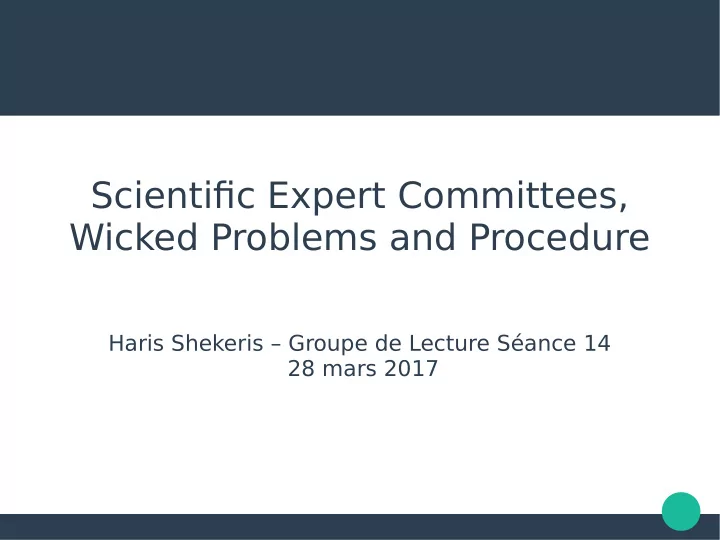

Scientifjc Expert Committees, Wicked Problems and Procedure Haris Shekeris – Groupe de Lecture Séance 14 28 mars 2017
Presentation Plan ● Paper Walk-through ● I. Introduction ● II. Four guiding assumptions ● III. Scientifjc expert committee decision-making as deliberative democracy in action ● IV. Conclusions ● Discussion of Weak points
Paper Walk-Through
I. Introduction ● Importance of science for policy- making ● Use of expertise in government (Plato to Habermas to the EU) ● Social features of science – need for more than one advisor ● Diffjculty of problems faced
I. Introduction ● The thesis and corollary in brief: ● Scientifjc committee decision-making may be adequately modelled as ideal deliberation on wicked problems by groups undertaking collective responsibility for their decisions. ● The key operative word is legitimacy, not rationality
II. Four guiding assumptions – Wicked problems ● ‘Tame’ vs ‘Wicked’ problems distinction’
II. Four guiding assumptions – Wicked Problems ● Origin of wicked problems: value-, goal- and interest-pluralism ● Climate change as a wicked problem (choice of framework, slippery problem defjnition, role of values)
II. Four guiding assumptions – Ideal deliberation ● Characteristics: ● Epistemic peers ● Equals and free ● Common conception of rationality ● Motivated by ‘force of better argument’ ● Seek consensus – Descriptive and prescriptive advantages
II. Four guiding assumptions – Plural subjects ● Joint commitment to X binds a group as a plural subject ● Obligations and entitlements ● Bond of the knowledge and justifjcatio produced initially internal – beginning of problem of legitimacy
II. Four guiding assumptions – Group responsibility ● Moral and political character of scientifjc expert committee deliberation ● Information asymmetry and masking, ‘contraction’ ● Group responsibility vs individual responsibility
II. Four guiding assumptions - Coherence ● Nature of the questions posed (technical vs abstract) ● Existence of expert committees vs their abolition ● Existence of unique solutions (ideal deliberators) vs lack of them (wicked problems) ● Individualism vs collectivism (plural subjects vs fact of disciplinary pluralism)
III. Scientifjc expert committee decision- making as deliberative democracy in action ● Question: how to ensure legitimacy of decisions reached – not obvious, given the complexity of the science-policy relationship ● Rationality powerless against complex problems, legitimacy less so
III. Scientifjc expert committee decision- making as deliberative democracy in action ● Rational deliberative proceduralism: reasons given, deliberation, legitimacy to be found in the procedure ● Epistemic proceduralism: the procedure is linked to a correctness standard
III. Scientifjc expert committee decision- making as deliberative democracy in action ● Argument One: confmation of actual and ideal procedure for scientifjc experts ● Argument Two: no signifjcant addition to quality by adding epistemic conditions for scientists ● Background assumption: If anybody is rational, then that’s scientists – excess of rationality
III. Scientifjc expert committee decision- making as deliberative democracy in action ● Procedure de-idealisation conditions: – Ample time for deliberation – Revealing of interests – Disciplinary and cultural diversity of scientists involved – Sortition ● Aim: shield against real-world challenges to legitimacy
IV. Conclusions ● Scientifjc committee decision-making ought to be thought of as ideal deliberation on wicked problems by groups undertaking collective responsibility for their decisions. As such, the question to ask is about the legitimacy, not the rationality of the decisions taken.
Weak Points (I) ● The deliberative democracy account envisages an all-encompassing deliberation – this is important because of the articulation of values (Link with Habermas on values as norms-rules). This may be important in the discussion of legitimacy. However my account is about a group deciding for another – how can I reconcile the two?
Weak Points (II) ● I mention that ideal deliberators have a common conception of rationality, however how can I shield against Estlund’s epistemic criterion of the quality of the deliberation? How can I adequately say that it’s not rationality that does the work, that it emerges from within the process? Is it enough to say that it’s a choice of focus?
Weak Points (III) ● Am I not importing epistemic conditions by the back door? (back to Estlund?) ● Is it satisfactory to say that these are to guard against challenges?
Thanks for listening – feedback time :)
Recommend
More recommend